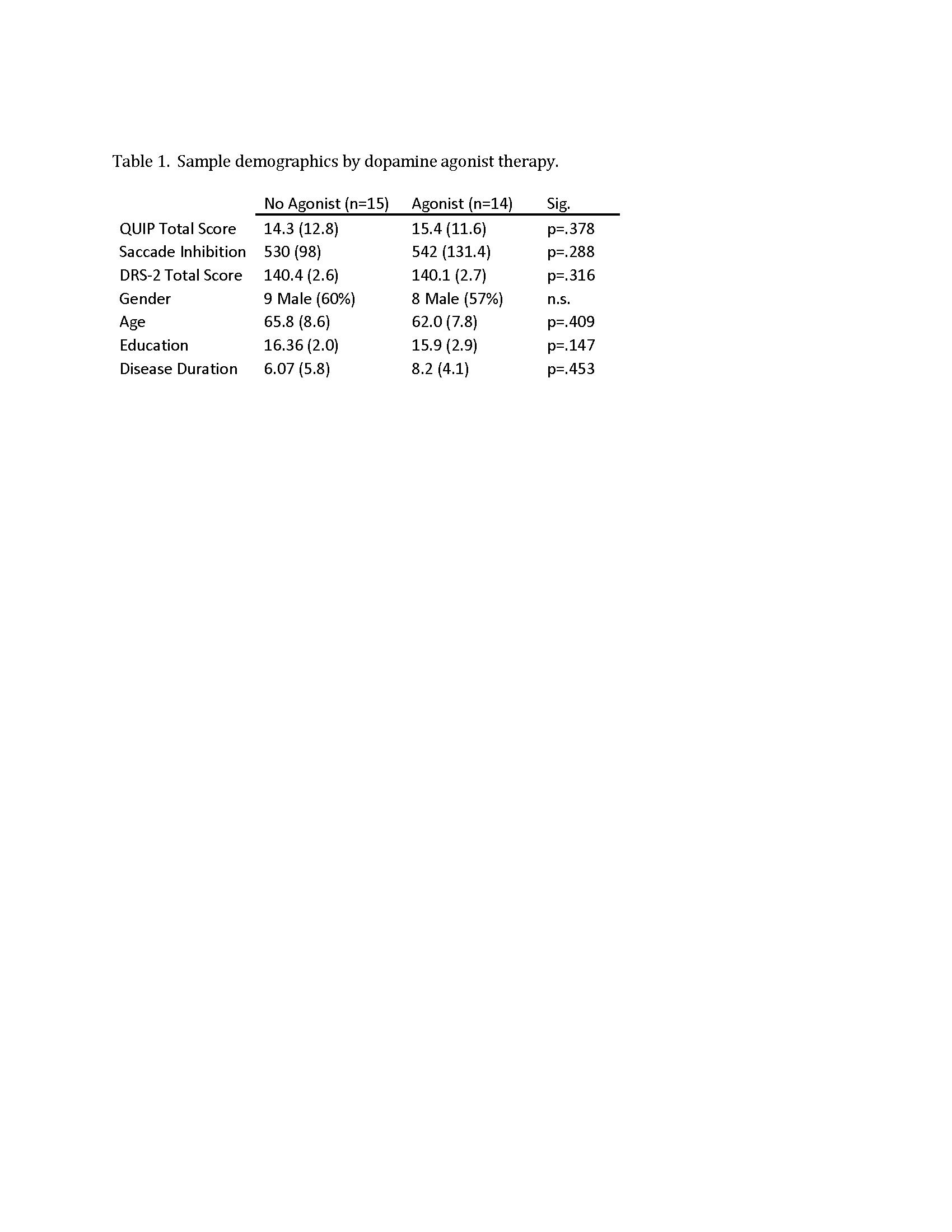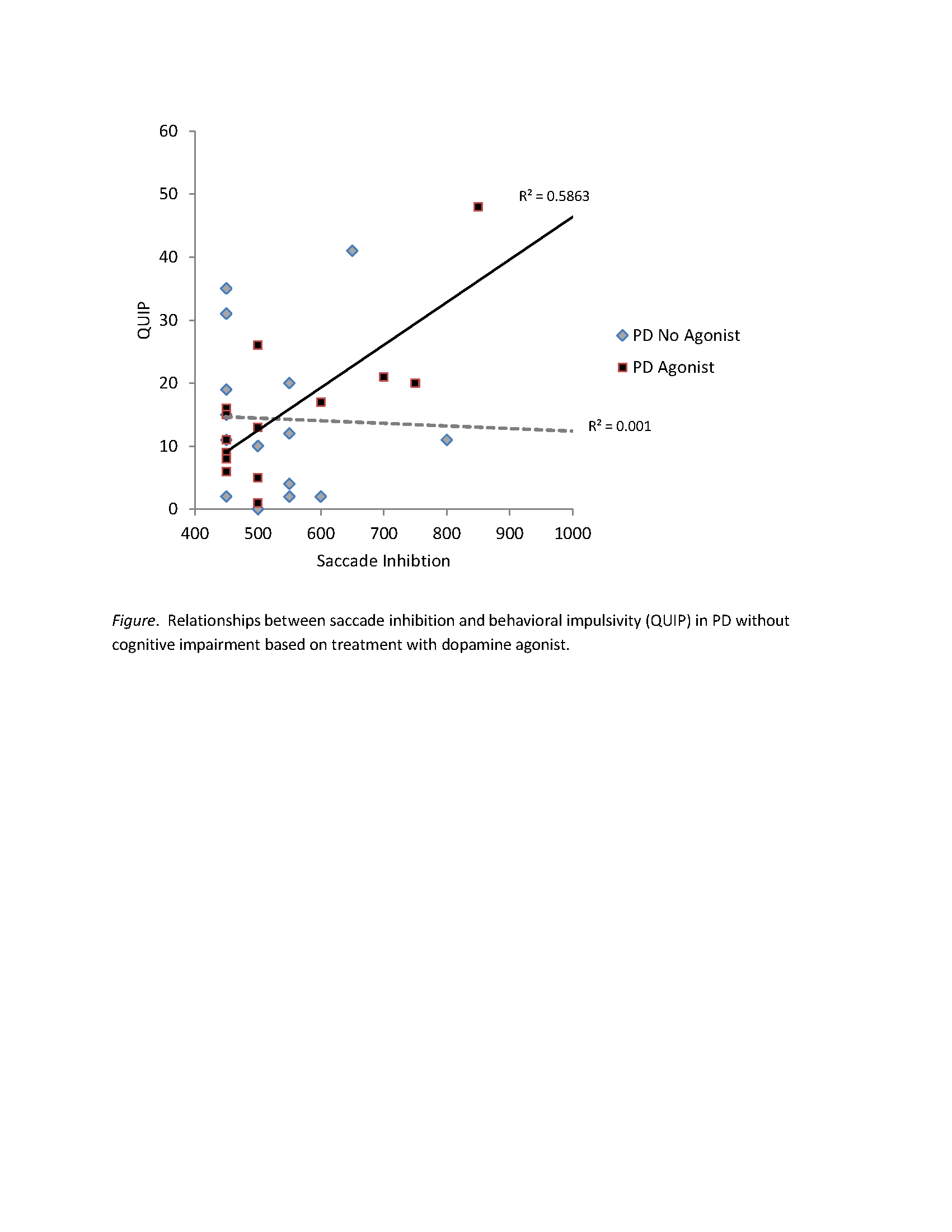Session Information
Date: Wednesday, June 7, 2017
Session Title: Parkinson's Disease: Psychiatric Manifestations
Session Time: 1:15pm-2:45pm
Location: Exhibit Hall C
Objective: Evaluate relationship between psychomotor inhibition and behavioral impulsivity in Parkinson’s disease (PD).
Background: Impulse control disorders can be challenging iatrogenic effects of dopamine agonist therapy for Parkinson’s disease (PD). Psychomotor disinhibition is also common in PD, and may underlie more complex behavioral impulsivity.
Methods: A sample of 29 PD patients without cognitive impairment completed a saccade inhibition task (anti-saccade) and responded to the Questionnaire for Impulsivity in Parkinson’s disease (QUIP)1. Cognitive status was determined via comprehensive neuropsychological evaluation in accordance with MDS Task Force Level II guidelines2. About half (n=14) were currently treated with one or more dopamine agonist.
Results: No differences in self-reported impulsivity (QUIP total score), saccade inhibition, or a global estimate of cognition (Mattis DRS-2 total score) were found between groups based on treatment with dopamine agonist. Groups were similar with respect to demographics and disease duration. In PD patients on dopamine agonist therapy (n=14), saccade inhibition was strongly associated with self-reported impulsivity (r=.77); however, no correspondence was found in PD patients not on agonist (n=15, r=.03). Associations did not change after controlling for age, gender, education, or disease duration.
Conclusions: While dopamine agonist therapy in cognitively intact PD may not directly affect saccade inhibition or increase self-reported impulsivity, it appears to mediate association between these measures. The absence of a direct effect raises question of whether dopamine agonist therapy may paradoxically reduce psychomotor disinhibition and behavioral impulsivity in some PD patients, and increase both in others. Current findings suggest utility of psychomotor inhibition measures, such as the anti-saccade task, for understanding and monitoring behavioral impulsivity associated with dopamine agonist therapy in PD. Further research of this phenomenon is warranted.
References: 1. Weintraub D, Stewart S, Shea JA, et al. Validation of the questionnaire for impulsive-compulsive behaviors in Parkinson’s disease (QUIP). Mov Disord 2009;24: 1461–1467. 2. Litvan I, Goldman JG, Troster AI, et al. Diagnostic criteria for mild cognitive impairment in Parkinson’s disease: Movement Disorder Society Task Force guidelines. Mov Disord. 2012;27(3):349–356.
To cite this abstract in AMA style:
T. Turner, J. Renfroe, V. Hinson. Dopamine agonist therapy mediates relationship between psychomotor inhibition and behavioral impulsivity in Parkinson’s disease. [abstract]. Mov Disord. 2017; 32 (suppl 2). https://www.mdsabstracts.org/abstract/dopamine-agonist-therapy-mediates-relationship-between-psychomotor-inhibition-and-behavioral-impulsivity-in-parkinsons-disease/. Accessed January 19, 2026.« Back to 2017 International Congress
MDS Abstracts - https://www.mdsabstracts.org/abstract/dopamine-agonist-therapy-mediates-relationship-between-psychomotor-inhibition-and-behavioral-impulsivity-in-parkinsons-disease/


